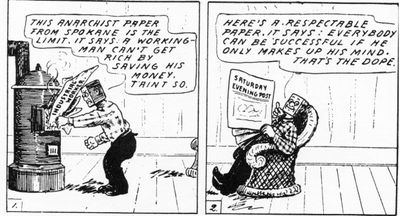I checked out a new podcast on my walk to the grocery store this afternoon. The Final Straw Radio podcast had an interview with Sean Carleton, a historian from Winnipeg and Ian McIntyre, and activist from Australia. They collaborated on a book called Mr. Block: The Subversive Comics and Writings of Ernest Riebe and were talking about Ernest Riebe, his legacy and the complexities of creating the book.
This was all brand new to me. I hadn't heard of Riebe, the character of Mr. Block, or even the Industrial Workers of the World, the early 20th century organization which published Riebe's cartoons.[1] Well let me tell you, it was a fascinating talk and I learned a lot.
First is the comic. Mr. Block is, well, a blockhead. He keeps thinking the bosses will eventually do right by their workers, even though he is always getting paid the least, getting the most abuse, etc. etc. While he is the butt of the joke, the stories are making the issues come to life, and hopefully will inspire workers to organize.

Mr. Block gets news only from the bosses' paper, 1913. Source: Wikipedia
Second is the timing. These comics were printed between 1912 and 1920! While the setting may be dated, the messages are still relevant over 100 years later.
Third is the work involved in pulling this material together. The comics were printed in IWW flyers and newspapers. Most of the printed material was impounded and destroyed during US government raids in the 1920s. Some of what remained was available on microfilm in University archives, but the photos were all too high contrast to see the comics clearly, because they focused on the text, as opposed to cartoons and other 'ancillary' items.
Mr. McIntyre found some original papers in University archives in Australia, but the newsprint was so fragile that they would not withstand being scanned. So it took a group of artists in Canada to restore each comic individually in order to create the book.
It took an immense amount of work to bring back this piece of organized labour and activist history. I was struck by how little I know about the history of organized labour and social activism. What little I know is snippets about the Winnipeg General Strike, and a modern folk song about the shooting of miners in Bienfait, Saskatchewan in 1931.[2] That's an embarrassingly small amount.
I was also struck by the story of how US Federal Agents raided the IWW in 1917, where many of these potential historical archives were seized. I'm always agog by how early unions were suppressed Sure, I don't know that level of detail about US history, but I bet most Americans don't know this story either. (I did some googling and found this article about the Palmer Raids)
And as I write this, I am still amazed at how much of our history is being lost every day. And not even history from 50 or 100 years ago. Current stuff too. I tend to obsess with keeping my digital house in order (heck, this website is my latest attempt to get all my online writing in one place) but I know I am in the minority.
We lose several excellent philatelic websites every year as the authors pass on and nobody in the family is willing, or knows how, to keep the websites running. And heck, even with my digital fastidiousness, I spent all afternoon looking for a soup recipe for Cindy before concluding it never made it on the move from Regina to Victoria.
All in all, it was a very productive trip to and from the grocery store. I have a new podcast to add to my listening queue and I'm looking forward to learning more. And I am even more wary about keeping my meager files in order; open, accessible and transferable.
I knew about Sean Carleton via his tweets, and when I saw his name in a blog post, I clicked through to the podcast. Serendipity! ↩︎
Small Rebellion, by James Keelaghan. Here it is via YouTube ↩︎